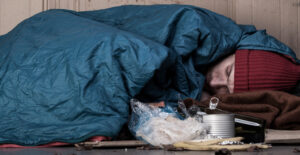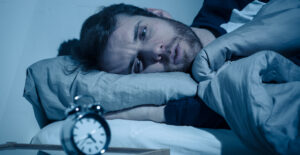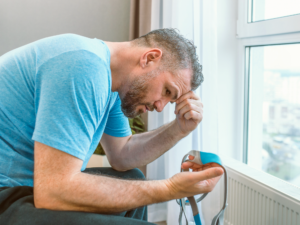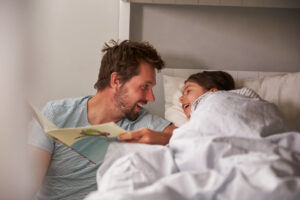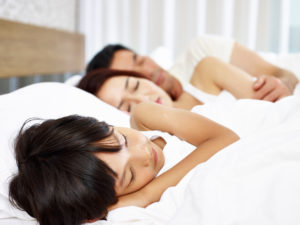Fostering Sleep in the Family: An Interview With Dave Gibson
| Key points |
|---|
|
Introduction

For parents, establishing quality sleep routines in their children can be a difficult task. From getting newborns to sleep through the night, to the ever-present temptation of the cell phone for teenagers, there can be numerous obstacles to getting children and families into good sleep habits.
Dave Gibson is a London-based osteopath, online sleep coach, hypnotherapist, and naturopath. In a recent conversation with Sleep Foundation, Gibson shares why we need to establish a child’s sleep habits early in their lives, how we can create positive associations in children with sleep and their bedrooms, and why good sleep routines need to be modeled by the parents. The conversation has been lightly edited for clarity and concision.
Interview
Sleep Foundation (SF): Thanks for your time today! I’d like to begin by discussing your background. How did you initially become interested in this field of sleep?
Dave Gibson (DG): I had a childhood where sleep wasn’t really mentioned. I had two parents — one who didn’t sleep, my mother, and one who slept every time he could, which was my dad. I have my mom’s sleep genes, so I have to work hard at getting to sleep. So when I look back to my history, I had poor sleep. I was never told that sleep was important, was never encouraged to do it, and I was never educated on it. In fact, if I had behaved properly and if I’d have done well at school, I could stay up late at night to watch the midweek sport, so I was getting rewarded for losing sleep. And by the time I got to my teenage years, I was allowed to play in a band midweek until midnight. My dad was a former semi-pro musician, so I was encouraged to follow that, and I’d be the kid at the back of the class falling asleep.
I really didn’t think that sleep was anything worth having. I didn’t correlate poor sleep with poor health. I didn’t correlate poor sleep with being moody. It just wasn’t mentioned, and in fact in the [United Kingdom], we had Margaret Thatcher supposedly claiming that sleep was for wimps. She was talking about four hours of sleep being fantastic. Certainly her reputation as being an iron lady was in part created by four hours of sleep being a badge of super-human strength and a benchmark of endurance. In those days, traders in the city used to boast too about how little sleep they needed. Even now there’s a piece of research done recently that indicated it’s regarded as masculine to be underslept. This is despite all the scientific evidence proving that a good night’s sleep is vital to our short- and long-term health. People who sleep too much are looked down on. People who get the right amount of sleep, well why do you need that much?
“Even now there's a piece of research done recently that indicated it's regarded as masculine to be underslept. This is despite all the scientific evidence proving that a good night's sleep is vital to our short- and long-term health. People who sleep too much are looked down on.”
When I left university, I went into advertising, and I was highly stressed. I used alcohol to get to sleep, and then once I decided I didn’t want to drink anymore, I couldn’t get to sleep. It was my sedation. I very quickly re-engineered my life. I got the opportunity to retrain as an osteopath, and about 20 years ago, I started to treat people who had sleep problems. After helping osteopathy clients, I retrained as a hypnotherapist. I was always a naturopath, and I found that I was solving a lot more problems than just bad backs.
Very quickly I became more interested in sleep, because it was a more fundamental issue that we all face. And it’s not just me, it’s the families that we are in, it’s the workplaces that we’re in. It is a universal health problem now.

SF: When you entered osteopathy, did you want to be someone focused exclusively on sleep, or did that emerge as you were in your practice?
DG: Twenty-five or 26 years ago, sleep wasn’t mainstream. When I was a student, I had no problems pulling all-nighters to study. I had no idea that if I pulled an all-nighter I wasn’t likely to be able to regurgitate the facts that I had learned in the following day’s test. If somebody had told me that, I’d have gone to bed on time. I can’t imagine why that’s not common practice in all universities. It should be absolutely spoon fed to children and university graduates, because it’s a no-brainer. It’s now proven that children who get better sleep get better results in exams.
I approach health from all different angles, so I get people coming to me either for a specific health need or a global intervention. And it’s interesting when you look at the things that are components of health. You can’t get away from exercise, sleep, and food. And they all crossover and interconnect. When you look at the rise in obesity and the decrease in sleep, they’re pretty much interlinked, too. When you look at the reduction in exercise, the gain in weight, and the lack of health, the whole thing feeds together in a complex of interrelationships. But certainly when I talk to people, most people aren’t getting enough sleep. Even if they’re not asking me for sleep advice, they’re getting it.
SF: Why do you think it’s important to speak directly to the sleep hygiene of children?
DG: If you think about learning a language or any skill, when the brain’s being formed, it’s a lot easier to ingrain it. I don’t think you can create a good night’s sleep for one person within a family. It’s a culture that you have to embrace for everybody. Children are very good at looking at what’s fair. They’re great at copying us, but they also know what’s fair. So if you’re the parent with the mobile phone in the bedroom overnight as an adult, why can’t they have one? If you’re the parent who’s having a bottle of soda, why can’t they have one? If you’re the parent who’s having a snack, why can’t they have one?
Leading by example is one thing, but also really educating a child, telling them why they’re doing what they’re doing, is key too. I get really frustrated when I listen to people [say to their children], for example, “You’ve been great, have a sweet. You’ve been great, have a cake.” It’s a reward for something that’s out of sync with the healthy positive behavior that you’re rewarding.
Sleep is a package. Talk to your child about sleep. Educate them about sleep. Make it exciting. Talk about dreams. Make their bedroom something that’s only for sleep. Don’t let them have toys in there. Try and get them to play outside the bedroom, so they’re not experiencing the bedroom as being an environment where they’re buzzing. Also never send a child to their room as punishment it’s just a crazy association. And really talk to them about [the benefits of sleep]: “You’re going to sleep to be better. You’re going to sleep to rejuvenate your body, to make your brain better, your muscles better, your skin better.” Talk to them in an age-appropriate way to get them excited about sleep and welcoming it, rather than being resistant to it.
Most kids don’t want to go to bed. Most kids hate going to bed. But if you make it fun, if you make the bed being at the end of a really good sleep routine, you can ease them into it.
SF: So it’s about creating a positive association with sleep and the bedroom, as opposed to a negative one, and creating the bedroom as a place they should look forward to.
DG: Oh, absolutely. I think the problem that we have these days is that we’re all doing too much. We have a 24/7 lifestyle, often becoming over-attached to technology and especially mobile phones. Now we’ve got the work/life balance and work-from-home problem. We are working later into the night, and having time to ourselves and time for our kids becomes hard. It’s hard to juggle that. I encourage all the clients who I work with to really plan it out: Look at when you’re going to give the time to your children, look at how you’re fitting your life around their needs, and that you’re getting the things that you need to relax and switch off at night, too.
But really you’re creating a problem if you’re allowing a child to be underslept. You’re creating a time bomb.
Obesity is a factor that is categorically linked to being underslept. Not just in terms of the sugary foods that we choose when we’ve got the pangs of hunger, but also in terms of the ways that we have an increased opportunity to snack. Obese children tend to be under-exercised, too. There’s a whole package that goes together with underslept children and obesity. Each of them has to be tackled together.
SF: I want to ask you about sleep for newborns and infants. Those first months of a newborn’s life are defined by their ability to sleep — or not. And the question new parents often get is, “How is your baby sleeping?” And maybe also, “How are you sleeping?” If you had to talk to new parents about this anxiety of getting their kids to sleep, what would you say? Or, what do you tell new parents about helping their kids learn to sleep?
DG: The “temperament” of a baby is what they are born with and this has a huge influence on their sleep. Quite a large proportion, about 30%, of a baby’s nighttime sleep, is associated with their genetic chronotype, or sleep genes. So often a baby’s nighttime sleep tends to be a given.
With daytime sleep, you can develop a nap schedule and develop feeding schedules. The trick here is to guide their nap schedule to make sure they accumulate the right level of adenosine, which drives their need for sleep. As the infant transitions into baby and toddlerhood, the window of time between the last nap and bedtime gets longer. There is a correlation between babies being ready to drop the number of naps in the day with being able to manage longer periods of time awake.
I always try to get a parent to get their child into a sleep schedule. I definitely do not advise parents letting them cry themselves to sleep. I encourage babies to be comforted and soothed. I would start by having parents teach a baby how to self-soothe. So for example, never put a baby down asleep. The aim here is to put your baby down to sleep, aware of their surroundings and drowsy. The goal is to put babies down almost asleep, so that they learn the ability to fall asleep on their own. Babies get mini sleeps — when they wake up, they need to have the opportunity to get back to sleep on their own. But certainly the idea that I give everybody is that with babies, you start where you start. If you’ve got a baby who doesn’t sleep, your job is to get them to sleep a little bit better, and then a little bit better, and a little bit better.
“The goal is to put babies down almost asleep, so that they learn the ability to fall asleep on their own. Babies get mini sleeps — when they wake up, they need to have the opportunity to get back to sleep on their own.”
You’re very unlikely to get a baby who has problems sleeping to instantly not have them, unless they’ve got something physically wrong. For example, a baby who is underfed due to tongue-tie and is short on sleep due to too many night awakenings tends to sleep better once the tongue-tie is sorted and they are properly nourished. So once you’ve got the baby able to fall asleep out of your arms on a safe sleep surface, then you can start to back off a little in the bedroom and wait until they are asleep before leaving. Then you get a little bit further away each night until you can put them down and stand by the door. Eventually you can put them down and walk out of the bedroom and they will fall asleep in their cot on their own. But from the research that I’ve seen, I wouldn’t let a baby cry itself to sleep on its own.
SF: You’ve mentioned the importance of keeping kids on a sleep schedule. What does a good nighttime routine look like for children?
DG: It will vary according to what they enjoy. It will vary according to the type of child that they are with their age. It should be a routine with which you have got their buy-in. You want them to not be sold on the idea, but literally interested in it. It should be age-appropriate and designed for them. I like baths. I think baths work well. We now know that a decrease in core temperature encourages us to get to sleep more easily. So I think a routine that always involves a bath in which your body cools down afterward is great. Even putting on socks, for example, can work. If you heat your feet up with socks and then take them off before you go to bed, you get that reduction in core temperature. Our physiology is designed around the sun going down. Prehistorically, we would have a decrease in temperature, which would have helped us initiate sleep.
Getting the temperature right is important, and so is getting the light right. Look at decreasing the lights and illumination at night. Avoiding technology which emits blue light is key, particularly for teenagers. Blue light stops the production of melatonin, which is the hormone that produces our “desire” to sleep. Teenagers are more sensitive to the blue light that technology screens emit. So always look at putting dimmers on the blue light technology and wearing glasses that filter out blue light to get that blue light out of your system, ideally an hour before bedtime.
“Blue light stops the production of melatonin, which is the hormone that produces our “desire” to sleep. Teenagers are more sensitive to the blue light that technology screens emit.”
Look at some form of mindfulness or meditation to help children to relax and “switch off.” There’s lots of research now showing that mindfulness, meditation, or yoga nidra all create a brainwave that’s very similar to the deep sleep brainwave, so they get you into that stage quicker. And it’s a better way of switching yourself off.
Then do something that you find relaxing, such as reading a book, doing a puzzle, or something where you’re engaged as a family doing something that doesn’t involve being hyped-up on social media. Stay away from things that are mentally stimulating, and put that together in a routine that you can keep to consistently — ideally every night.
Our human brain really does like routine. Keep as close as possible to the same bedtime seven days a week. That, again, is what the body clock expects. Certainly all the research suggests, even with teenagers, that if you set them a bedtime they are more likely to get more sleep. So even when teenagers want to rule their own lives, giving them a bedtime is the way to go.
SF: The stereotype of the teenager is one who stays up late and wakes up late; their circadian rhythm just shifts later, all-around. Is that something we should be mindful of, or work to correct? Or is that just what our bodies do when we’re adolescents?
DG: I think the western world does teenage students a disservice. If I had the choice, I’d be putting school start times around their body clock rather than making them fit in with school start times. That two hour circadian shift is well known. It’s not debatable. There are so many pieces of research that show the benefits of having an age-appropriate school start times. It’s crazy that every single school doesn’t do it. Because [the research shows] the performance goes up, the amount of lateness goes down, the attendance goes up, the risk-taking goes down, the addiction goes down. Every single measurement that you want suggests that if you give the right school start time, fitting in with that shift in circadian rhythm, you’ve got a winner. So that would be one part of it.
Another part would be looking at caffeine. We need to really get that out of a teenage body, because they shouldn’t be having it. But what’s also happening is their sense of sleep deprivation in the day is being removed with caffeination, so teenagers are over-caffeinating themselves, and that’s again keeping them awake at night.
I also think one routine for everyone in the home is that phones aren’t allowed in the bedroom overnight. That stops the late night use of technology, and certainly children who use technology in the bed at night have less sleep than children who don’t. It’s linked. And I think the problem that we’ve got is, how do you cope with that body clock shift? You can’t. You can’t get a teenager to go to bed at 9:00. It’s just not physically possible, because the melatonin isn’t being secreted then. So then you look at the weekend. Should you let them catch up on sleep? Yes. How much? Maximum two hours. Does that mean they’ve got a sleep debt? Yes, if they’ve knocked two hours off their recommended sleep each school night — which a lot of teenagers do — teenagers should be sleeping between eight to ten hours each night.
Most of them are not getting anywhere near that, it’s such a small percentage who do. So that idea of being underslept and then trying to catch up on the weekend — you can’t catch up on all of it. And certainly your physiology doesn’t accept all of it back. If you let them sleep in too late on a Sunday, you’re then messing the body clock up for getting to sleep on time that night, which sets them up for the five days of the week that they’ve got to try and crack through. This creates a syndrome called social jet lag which knocks your body clock out of sync, making it even harder to get to sleep. So it’s a difficult one. Again, it’s not something you can license against, but certainly the evidence is if you set the school start times closer to the teenage circadian rhythm, you’ve got a winner.
SF: Do you think the solution to some of these issues is a policy solution, like shifting school start times or stronger messaging from the government? Or do you think it must be a family-centric solution? Or is it somewhere in between?
DG: I think that categorically it is a policy decision. When I talk to people about the crisis of obesity versus the crisis of sleep … I mean, schools put a vending machine there knowing that if they put sugary and sweet foods in it, they’re going to get the extra money they need to fund extra-curricular activities. So poor nutrition is being sustained because of the school’s financial need.
So it starts with funding education properly, which includes money for sport inside and outside of school times. I’ve never seen anybody tell me that fruit and vegetables are cheaper than processed food. That relationship between the affordability of food and the affordability of calories means that in certain social demographic situations, we’re going to buy the poorer food and the processed carbs because that’s all that’s affordable. And that then leads to decreased sleep, and that then leads to a carbohydrate problem, as we crave sugary, carbohydrate-dense foods when we are sleep deprived.
“I think three things need to happen. One is, legislation to target the changes that we need. So, somehow making fruit and vegetables more affordable versus processed carbs. We need to look at the school start times, definitely. Finally, we need to look at education, across the board.”
I think three things need to happen. One is, legislation to target the changes that we need. So, somehow making fruit and vegetables more affordable versus processed carbs. We need to look at the school start times, definitely.
Finally, we need to look at education, across the board. Starting with primary school children, through secondary, through adolescence, and also encourage parents and teachers to be part of that education process. So having education for families and school kids at the same time, and really looking not just about sleep, but at the food choices and how to teach children to relax and switch off. And then looking at educating people about boundaries around technology would be one key part of that health package of skills.
I have a pretty firm rule that if you have breaks from technology, you’re more likely to get to sleep on time. So things like no tech in the morning before breakfast. Tech breaks during meals. No tech an hour before bed, and no tech in the bedroom. Those four boundaries around tech would give you a structure to at least de-adrenalize the brain, detaching it from the over-stimulation of tech.
SF: Thanks for your time with us! We’ll give you the final word. Any parting ideas you’d like to leave us with?
DG: You can’t tell a child what to do, you’ve got to show them. That would be the key to it all. Also, without technology, I don’t think we’d be having this conversation. I think technology, and particularly the way that social media has come into the world of kids, has caused the sleep crisis in our children more than anything else. It’s up to us as adults to model different behaviors, so our children are copying the right things. Also, we need to give them our time and attention, rather than us being stuck to a mobile phone or on technology ourselves at night.
















